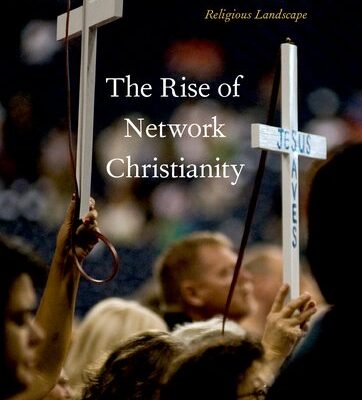[Updated February 6, 2018]
The Los Angeles Review of Books and two academic journals reviewed The Rise of Network Christianity: How Independent Leaders Are Changing the Religious Landscape, by CRCC’s Richard Flory and Brad Christerson. The book explains the social forces behind the fastest-growing form of Christianity in the U.S., which Christerson and Flory have labeled “Independent Network Charismatic.” The book was supported by CRCC’s Pentecostal and Charismatic Research Initiative.
Written by philosopher James K.A. Smith, the Los Angeles Review of Books’ review covers how INC Christianity reflects California from its roots to its marketing through YouTube and other online media. He also points to what he sees as problematic issues in governance that make followers of this brand of religion vulnerable to charismatic strongmen. A summary of his review:
This book is an important introduction to a form of Christianity you’ve likely never heard of — but need to. Evidence suggests “this subset of neo-Charismatic Christianity is one of, if not the, fastest-growing subset of Christianity in the United States and around the world.” For Christerson and Flory, this isn’t just a look into a sector of charismatic Christianity — it is a reconnaissance report on the future of American religion: “The rise of INC Christianity,” they argue, “is symptomatic of larger, macro-structural changes in American society, and as a result other American religious traditions will likely take on some of the characteristics of INC Christianity in the near future.” And while the publication date of this book (March 2017) limited the opportunity to draw parallels with Trumpism, the volume offers insights into a religious mindset and posture that could partly explain the rise of a populism eagerly awaiting a strongman savior.
Click here to read the full review.
The review in Sociology of Religion, produced by the Association for the Sociology of Religion, begins with an analogy to a chef who spread his fame without having to manage far-flung restaurants around the world by teaching other chefs online and through seminars. It continues:
This is essentially what Christerson and Flory describe in their well-researched and well-executed book, but rather than chefs with innovative cuisine, their book examines leaders with roots in the neo-Charismatic movement who have gained attention through dynamic preaching styles and an ability to “offer compelling experience of the supernatural” (160). These leaders, or “apostles,” are distinctive because instead of aiming to build a denomination of churches that they directly oversee, these leaders are content with establishing looser networks of influence.
Click here to read the full review.
Reading Religion, a publication by the American Academy of Religion, also published a review. Here’s an excerpt:
The authors’ aims are clearly defined and unpacked throughout the book. They substantiate their claim that INC Christianity is a rapidly growing sub-group in neo-Charismatic Christianity and argue that it will influence mainstream Christian practices in years to come. Their discussion of networks in the religious economy is useful in understanding the influence of INC Christianity in the changing religious landscape of America; it holds a niche market and is expanding its market share (160).
Click here to read the whole review.







